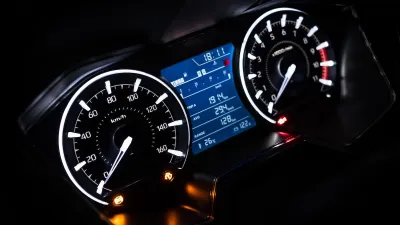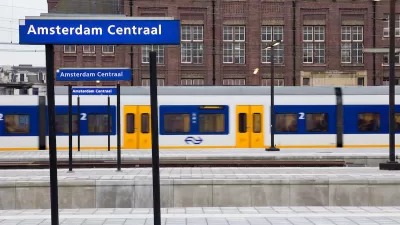Two years ago a Dutch city embarked on a trial for distance-based pricing that placed a meter on the dashboard showing the price of the trip. The plan was scratched due to an election. In OR, VMT fee legislation for electric vehicles has stalled.
"Hooked up to the Internet wirelessly and to GPS, the (Dutch) system tabulates a charge for each car trip by using a mileage-based formula that also takes account of a car's fuel efficiency, the time of day and the route. (Driving on busier thoroughfares costs more than driving on less-traveled roads.) At the end of each month, the vehicle's owner would receive a bill detailing times and costs of usage, not unlike a cellphone bill".
The variable, vehicle-mile-traveled fees would have been less for most drivers than the 'fixed fees', including sales taxes and registration fees) and the gas taxes that would be replaced by the meter charges.
"Equally important, studies have found that the meters provide instantaneous negative feedback, the kind that psychologists say changes behavior". In other words, there was a reduction in driving, especially on congested roads where rates were higher.
Regardless of the cost saving to the motorist and the benefits to society, the political challenge remains formidable.
Thanks to Charles Komanoff
FULL STORY: In Auto Test in Europe, Meter Ticks Off Miles, and Fee to Driver

Maui's Vacation Rental Debate Turns Ugly
Verbal attacks, misinformation campaigns and fistfights plague a high-stakes debate to convert thousands of vacation rentals into long-term housing.

Planetizen Federal Action Tracker
A weekly monitor of how Trump’s orders and actions are impacting planners and planning in America.

In Urban Planning, AI Prompting Could be the New Design Thinking
Creativity has long been key to great urban design. What if we see AI as our new creative partner?

King County Supportive Housing Program Offers Hope for Unhoused Residents
The county is taking a ‘Housing First’ approach that prioritizes getting people into housing, then offering wraparound supportive services.

Researchers Use AI to Get Clearer Picture of US Housing
Analysts are using artificial intelligence to supercharge their research by allowing them to comb through data faster. Though these AI tools can be error prone, they save time and housing researchers are optimistic about the future.

Making Shared Micromobility More Inclusive
Cities and shared mobility system operators can do more to include people with disabilities in planning and operations, per a new report.
Urban Design for Planners 1: Software Tools
This six-course series explores essential urban design concepts using open source software and equips planners with the tools they need to participate fully in the urban design process.
Planning for Universal Design
Learn the tools for implementing Universal Design in planning regulations.
planning NEXT
Appalachian Highlands Housing Partners
Mpact (founded as Rail~Volution)
City of Camden Redevelopment Agency
City of Astoria
City of Portland
City of Laramie





























